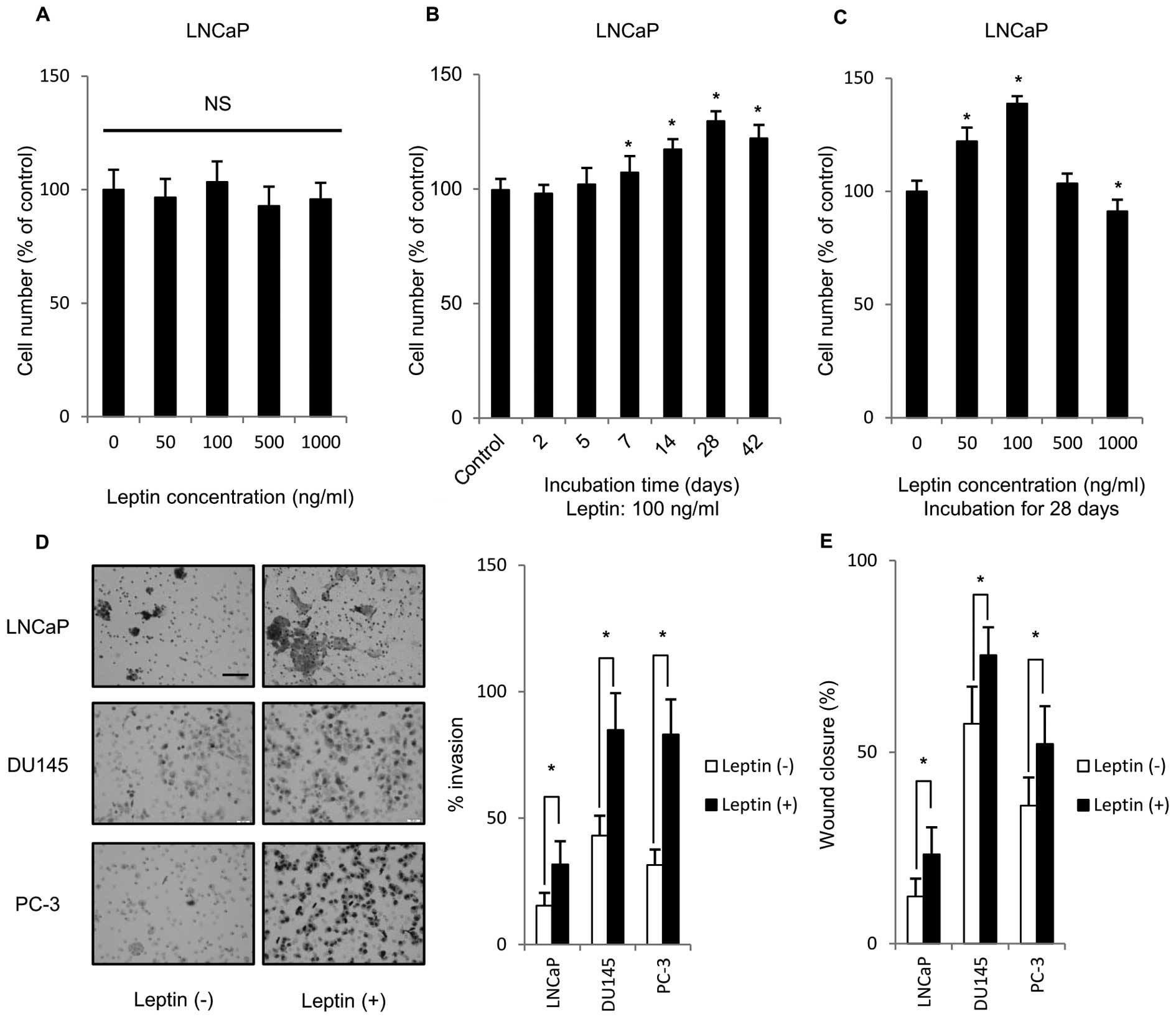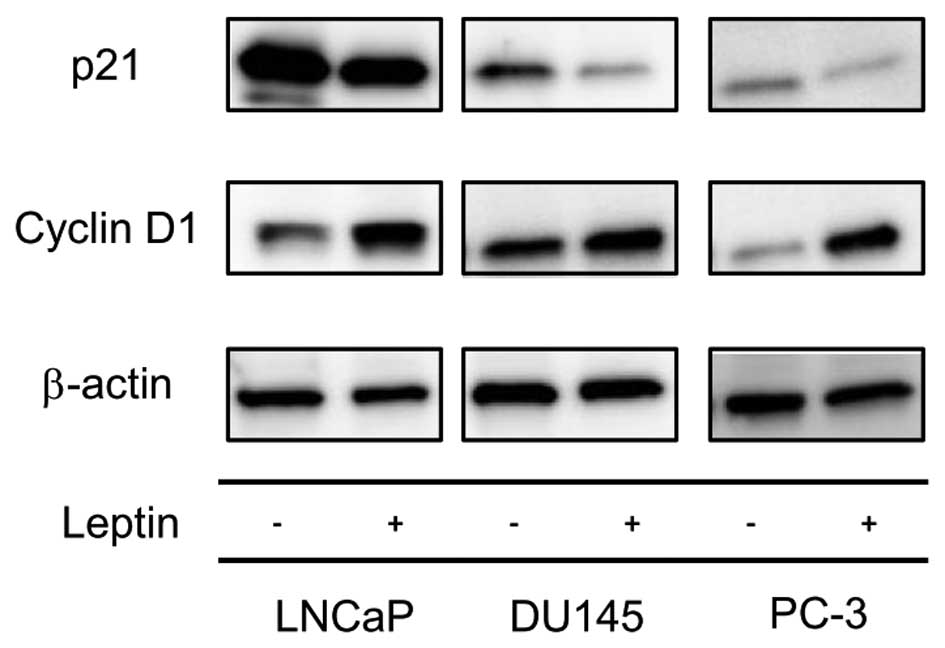|
1
|
Kaneko G, Miyajima A, Yuge K, Hasegawa M,
Takeda T, Jinsaki M, Kikuchi E, Nakagawa K and Oya M: Periprostatic
fat area is an independent factor that prolonged operative time in
laparoscopic radical prostatectomy. Urology. 82:1304–1309. 2013.
View Article : Google Scholar : PubMed/NCBI
|
|
2
|
Japanese Ministry of Health, Labour and
Welfare. Results of Kokumin-Kenkou-Eiyou Chousa (in Japanese).
http://www.mhlw.go.jp/.
|
|
3
|
Bray GA: The underlying basis for obesity:
relationship to cancer. J Nutr. 132(Suppl 11): 3451S–3455S.
2002.PubMed/NCBI
|
|
4
|
Utada M, Ohno Y, Soda M and Kamo K:
Estimation of cancer incidence in Japan with an age-period-cohort
mode. Asian Pac J Cancer Prev. 11:1235–1240. 2010.
|
|
5
|
Giovannucci E, Rimm EB, Liu Y, Leitzmann
M, Wu K, Stampfer MJ and Willett WC: Body mass index and risk of
prostate cancer in U.S. health professionals. J Natl Cancer Inst.
95:1240–1244. 2003. View Article : Google Scholar : PubMed/NCBI
|
|
6
|
Andersson SO, Wolk A, Bergström R, Adami
HO, Engholm G, Englund A and Nyrén O: Body size and prostate
cancer: a 20-year follow-up study among 135006 Swedish construction
workers. J Natl Cancer Inst. 89:385–389. 1997. View Article : Google Scholar : PubMed/NCBI
|
|
7
|
Schuurman AG, Goldbohm RA, Dorant E and
van den Brandt PA: Anthropometry in relation to prostate cancer
risk in the Netherlands Cohort Study. Am J Epidemiol. 151:541–549.
2000. View Article : Google Scholar : PubMed/NCBI
|
|
8
|
Freedland SJ: Obesity and prostate cancer:
a growing problem. Clin Cancer Res. 11:6763–6766. 2005. View Article : Google Scholar : PubMed/NCBI
|
|
9
|
Mistry AM, Swick AG and Romsos DR: Leptin
rapidly lowers food intake and elevates metabolic rates in lean and
ob/ob mice. J Nutr. 127:2065–2072. 1997.PubMed/NCBI
|
|
10
|
Liuzzi A, Savia G, Tagliaferri M,
Lucantoni R, Berselli ME, Petroni ML, De Medici C and Viberti GC:
Serum leptin concentration in moderate and severe obesity:
relationship with clinical, anthropometric and metabolic factors.
Int J Obes Relat Metab Disord. 23:1066–1073. 1999. View Article : Google Scholar : PubMed/NCBI
|
|
11
|
Miller R, Tanofsky-Kraff M, Shomaker LB,
et al: Serum leptin and loss of control eating in children and
adolescents. Int J Obes (Lond). 38:397–403. 2014. View Article : Google Scholar
|
|
12
|
Sierra-Honigmann MR, Nath AK, Murakami C,
García-Cardeña G, et al: Biological action of leptin as an
angiogenic factor. Science. 281:1683–1686. 1998. View Article : Google Scholar : PubMed/NCBI
|
|
13
|
Somasundar P, Yu AK, Vona-Davis L and
McFadden DW: Differential effects of leptin on cancer in vitro. J
Sur Res. 113:50–55. 2003. View Article : Google Scholar
|
|
14
|
Chang S, Hursting SD, Contois JH, et al:
Leptin and prostate cancer. Prostate. 46:62–67. 2001. View Article : Google Scholar : PubMed/NCBI
|
|
15
|
Tewari R, Rajender S, Natu SM, Goel A,
Dalela D, Goel MM and Tondon P: Significance of obesity markers and
adipocytokines in high grade and high stage prostate cancer in
North Indian men - a cross-sectional study. Cytokine. 63:130–134.
2013. View Article : Google Scholar : PubMed/NCBI
|
|
16
|
Hoon Kim J, Lee SY, Myung SC, Kim YS, Kim
TH and Kim MK: Clinical significance of the leptin and leptin
receptor expressions in prostate tissues. Asian J Androl.
10:923–928. 2008. View Article : Google Scholar
|
|
17
|
Hardwick JC, Van Den Brink GR, Offerhaus
GJ, Van Deventer SJ and Peppelenbosch MP: Leptin is a growth factor
for colonic epithelial cells. Gastroenterology. 121:79–90. 2001.
View Article : Google Scholar : PubMed/NCBI
|
|
18
|
Hoda MR, Keely SJ, Bertelsen LS, Junger
WG, Dharmasena D and Barrett KE: Leptin acts as a mitogenic and
antiapoptotic factor for colonic cancer cells. Br J Surg.
94:346–354. 2007. View
Article : Google Scholar : PubMed/NCBI
|
|
19
|
Somasundar P, Frankenberry KA, Skinner H,
et al: Prostate cancer cell proliferation is influenced by leptin.
J Surg Res. 118:71–82. 2004. View Article : Google Scholar : PubMed/NCBI
|
|
20
|
Hoda MR and Popken G: Mitogenic and
anti-apoptotic actions of adipocyte-derived hormone leptin in
prostate cancer cells. BJU Int. 102:383–388. 2008. View Article : Google Scholar : PubMed/NCBI
|
|
21
|
Onuma M, Bub JD, Rummel TL and Iwamoto Y:
Prostate cancer cell-adipocyte interation: leptin mediates
androgen-independent prostate cancer cell proliferation through
c-Jun NH2-terminal kinase. J Biol Chem. 278:42660–42667. 2003.
View Article : Google Scholar : PubMed/NCBI
|
|
22
|
Deo DD, Rao AP, Bose SS, et al:
Differential effects of leptin on the invasive potential of
androgen-dependent and -independent prostate carcinoma cells. J
Biomed Biotechnol. 2008:1639022008. View Article : Google Scholar : PubMed/NCBI
|
|
23
|
Wang Y, Corr JG, Thaler HT, Tao Y, Fair WR
and Heston WD: Decreased growth of established human prostate LNCaP
tumors in nude mice fed a low-fat diet. J Natl Cancer Inst.
87:1456–1462. 1995. View Article : Google Scholar : PubMed/NCBI
|
|
24
|
Park SH, Chang SN, Baek MW, Kim DJ, Na YR,
Seok SH, Lee BH, Kim KS and Park JH: Effects of dietary high fat on
prostate intraepithelial neoplasia in TRAMP mice. Lab Anim Res.
29:39–47. 2013. View Article : Google Scholar : PubMed/NCBI
|
|
25
|
Garofalo C, Koda M, Cascio S, Sulkowska M,
Kanczuga-Koda L, Golaszewska J, Russo A, Sulkowski S and Surmacz E:
Increased expression of leptin and the leptin receptor as a marker
of breast cancer progression: possible role of obesity-related
stimuli. Clin Cancer Res. 12:1447–1453. 2006. View Article : Google Scholar : PubMed/NCBI
|
|
26
|
Ishikawa M, Kitayama J and Nagawa H:
Expression pattern of leptin and leptin receptor (OB-R) in human
gastric cancer. World J Gastroenterol. 12:5517–5522.
2006.PubMed/NCBI
|
|
27
|
Riolfi M, Ferla R, Del Valle L, et al:
Leptin and its receptor are overexpressed in brain tumors and
correlate with the degree of malignancy. Brain Pathol. 20:481–489.
2010. View Article : Google Scholar :
|
|
28
|
Howard JM, Beddy P, Ennis D, Keogan M,
Pidgeon GP and Reynolds JV: Associations between leptin and
adiponectin receptor upregulation, visceral obesity and tumour
stage in oesophageal and junctional adenocarcinoma. Br J Surg.
97:1020–2027. 2010. View
Article : Google Scholar : PubMed/NCBI
|
|
29
|
Zhang X, Tang N, Hadden TJ and Rishi AK:
Akt, FoxO and regulation of apoptosis. Biochim Biophys Acta.
1813:1978–1986. 2011. View Article : Google Scholar : PubMed/NCBI
|
|
30
|
Huang H and Tindall DJ: Dynamic FoxO
transcription factors. J Cell Sci. 120:2479–2487. 2007. View Article : Google Scholar : PubMed/NCBI
|
|
31
|
Li R, Erdamar S, Dai H, Wheeler TM, Frolov
A, Scardino PT, Thompson TC and Ayala GE: Forkhead protein FKHR and
its phosphorylated form p-FKHR in human prostate cancer. Hum
Pathol. 38:1501–1507. 2007. View Article : Google Scholar : PubMed/NCBI
|
|
32
|
Zhang H, Pan Y, Zheng L, Choe C, Lindgren
B, Jensen ED, Westendorf JJ, Cheng L and Huang H: FOXO1 inhibits
Runx2 transcriptional activity and prostate cancer cell migration
and invasion. Cancer Res. 71:3257–3267. 2011. View Article : Google Scholar : PubMed/NCBI
|
|
33
|
Zhang H, Fang J, Yao D, Wu Y, Ip C and
Dong Y: Activation of FOXO1 is critical for the anticancer effect
of methylseleninic acid in prostate cancer cells. Prostate.
70:1265–1273. 2010.PubMed/NCBI
|
|
34
|
Scodelaro Bilbao P and Boland R:
Extracellular ATP regulates FoxO family of transcription factors
and cell cycle progression through PI3K/Akt in MCF-7 cells. Biochim
Biophys Acta. 1830:4456–4469. 2013. View Article : Google Scholar : PubMed/NCBI
|
|
35
|
Berry E, Hardt JL, Clardy J, Lurain JR and
Kim JJ: Induction of apoptosis in endometrial cancer cells by
psammaplysene A involves FOXO1. Gynecol Oncol. 112:331–336. 2009.
View Article : Google Scholar :
|
|
36
|
Rena G, Guo S, Cichy SC, Unterman TG and
Cohen P: Phosphorylation of the transcription factor forkhead
family member FKHR by protein kinase B. J Biol Chem.
274:17179–17183. 1999. View Article : Google Scholar : PubMed/NCBI
|
|
37
|
Kau TR, Schroeder F, Ramaswamy S,
Wojciechowski CL, Zhao JJ, Roberts TM, Clardy J, Sellers WR and
Silver PA: A chemical genetic screen identifies inhibitors of
regulated nuclear export of a Forkhead transcription factor in
PTEN-deficient tumor cells. Cancer Cell. 4:463–476. 2003.
View Article : Google Scholar
|
|
38
|
Wen Q, Duan X, Liao R, Little P, Gao G,
Jiang H, Lalit S, Quirion R and Zheng W: Characterization of
intracellular translocation of Forkhead transcription factor O
(FoxO) members induced by NGF in PC12 cells. Neurosci Lett.
498:31–36. 2011. View Article : Google Scholar : PubMed/NCBI
|
|
39
|
Wu Z, Sun H, Zeng W, He J and Mao X:
Upregulation of MircoRNA-370 induces proliferation in human
prostate cancer cells by downregulating the transcription factor
FOXO1. PLoS One. 7:e458252012. View Article : Google Scholar : PubMed/NCBI
|
|
40
|
Chen Q, Ganapathy S, Singh KP, Shankar S
and Srivastava RK: Resveratrol induces growth arrest and apoptosis
through activation of FOXO transcription factors in prostate cancer
cells. PLoS One. 5:e152882010. View Article : Google Scholar : PubMed/NCBI
|
|
41
|
Lee SH, Kang YJ, Sung B, et al: MHY-449, a
novel dihydrobenzofuro[4,5-b][1,8] naphthyridin-6-one derivative,
induces apoptotic cell death through modulation of Akt/FoxO1 and
ERK signaling in PC3 human prostate cancer cells. Int J Oncol.
44:905–911. 2014.PubMed/NCBI
|
|
42
|
Liu P, Li S, Gan L, Kao TP and Huang H: A
transcription-independent function of FOXO1 in inhibition of
androgen-independent activation of the androgen receptor in
prostate cancer cells. Cancer Res. 68:10290–10299. 2008. View Article : Google Scholar : PubMed/NCBI
|



















